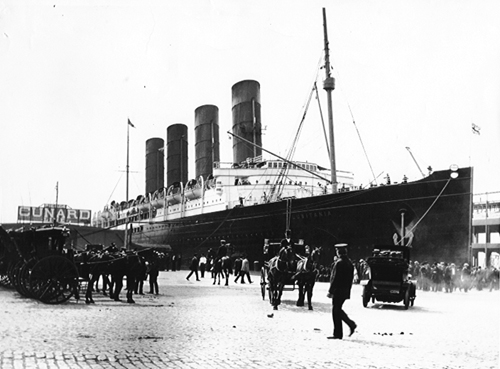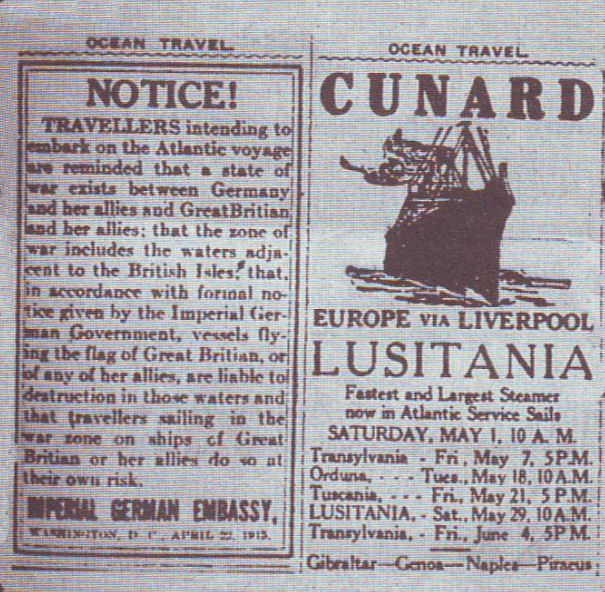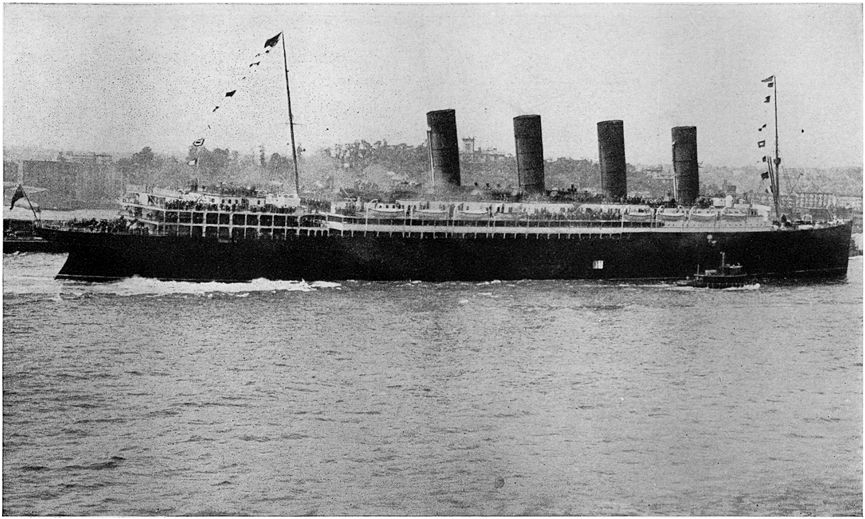Germany Issues Warning: Passengers Travel at Own Risk
Ship’s Owners Say No Contraband on Board
Special to The Great War Project
(30 April—1 May) On May 1st a century ago, the luxury ocean liner Lusitania is ready to set sail from New York, bound for Liverpool, England.
The ship is one of the few grand passenger ships of the Cunard line working the New York-to-Liverpool Atlantic crossing. It carries some 1200 passengers and another 700 crew. The crossing takes six day. It is a fast run.
It is a British ship and flies a British flag. It will sail through some very dangerous waters when it reaches the coast of Ireland and the seas near Britain.
German submarines are lurking, seeking any ships they can torpedo and sink.
In February Berlin informs the world it is undertaking unrestricted submarine warfare against any and all ships.
No exceptions.
The Germans are well aware of the Lusitania’s schedule. They issue a warning. On the day the ship leaves New York the German embassy in the United States places a notice in the New York newspapers.
The message is simple and chilling. “Vessels flying the flag of Great Britain, or of any of her allies, are liable for destruction,” the notice reads.
It adds a warning: Passengers traveling on board “do so at their own risk.”
The announcement is not directed toward any specific ship, but the operators of the Cunard line have no doubt the warning is addressed to the Lusitania.
Nevertheless, Cunard views the German warning as an empty threat. The Lusitania may be one of the world’s largest ocean liners, but it is the fastest civilian ship in the world.
Cunard issues a formal response. “The truth is,” Cunard’s statement reads, “that the Lusitania is the safest boat on the seas. She is too fast for any submarine. No German war vessel can get her or near her.”
But just to be on the safe side, Cunard tells its passengers…
…when the ship nears its destination, it will be protected by Britain’s Royal Navy.
In February Germany declared its policy of unrestricted submarine warfare against any ships, British or otherwise, in an effort to break the British blockade.
The British are stopping and seizing any ships bound for Germany’s ports whether they carry contraband or not. Contraband means munitions and any other key supplies that Germany needs to wage the war.
Increasingly this means food. The British navy – the most powerful naval force in the world – is bent on starving Germany into defeat. The blockade is beginning to bite. Germany must do something, or it will slowly be strangled to death.
The Lusitania is sailing at a moment in the war fraught with tension and agony. Just in the past two weeks, the army of the Ottoman Empire declares war on its Armenian population, leading to the mass deportation and murder of thousands of Armenian men, women, and children.
At the same time, the Germans use poison gas on the battlefield for the first time with the goal of breaking the stalemate on the Western Front.
This comes at just the same moment when the British invade the Gallipoli peninsula in western Turkey, aiming to seize the strategic waterway to the Ottoman capital Constantinople, and to knock the Ottoman Empire out of the war.
The Lusitania is due to arrive at Liverpool in six days’ time: Friday, May 7th.
Cunard officials claim there is no contraband on board.



